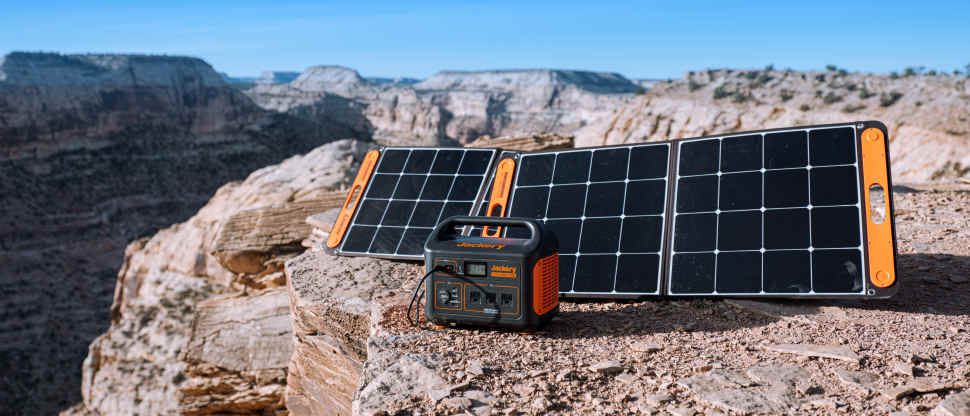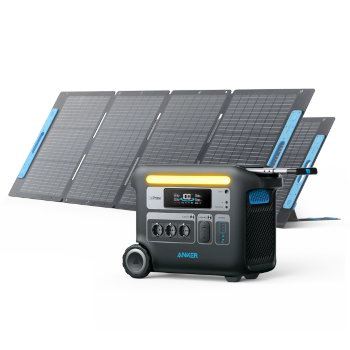What is a Solar Generator and Why You Need one?

A solar generator is an all in one device that uses sunlight to charge a battery to be stored for DC or AC use. It typically consists of solar panels, a charge controller, a power inverter, and a battery that enable efficient storage and use of energy. They can be bought with solar panels or without.
Is solar/battery better than a gas generator? Well that depends. If you are looking to power home appliances such as a refridgerator and smaller devices for very short-term ppwer outages that might occur infrequently and for a relatively short period of time, then the gas powered generator might be the answer for you.
If you are wanting to power these same such machines for power outages that last for a few hours or for long periods of a week or more than the solar powered generator would be my choice.
It might seem strange for the solar powered generator to win out in the shorter and longer term outages, but the reason for that involves two factors. Convenience and the power source, one is gas the other is sunlight.

The gasoline supply that you have at your residence is limited. In major power outages the availability of gasoline will almost nill. Even if the gas station has gas most will be closed because they don't have electricity to run the gasoline pumps and to power the lights and cash register.
Here are the advantages and disadvantages of each system that you should take into consideration.
Gas generators require fuel and more regular maintenance to keep running if allowed to sit they might not work when you need them as the gasoline will evaporate and could gunk up the carburetor. Solar panels and LiFoPo4 batteries are almost maintenance free with lifespans measured in decades.
Gas is less expensive investment upfront, but only good for short-term use. Gas will run out, solar will not.
Noise. Big annoyance and a beacon to people that want to take you stuff. In everyday power outages the noise is certainly a plus for solar generators. For long-term outages or even a forever outage the noise is an even bigger issue. Most people do not have a generator. And if a theif hears yours runnng they know you have something valuable, the generator which they can use or sale, but also know that you have gas which can be used in cars as well as the generator.

Also since a generator of any type is not a cheap commodity the ability to use a solar generator inside is a huge deal. A gas powered generator produces fumes and if you run it inside your home it will likely kill everyone inside due to Corbon monoxide poisoning! These deaths happen every time there are major outages. So being able to power you electrical devices from inside is a great advantage.
Solar generators harness energy from the sun, a renewable resource that won't run out any time soon.
Cost-Effective:
Once you invest in a solar generator you are finished with expenses. Over time, you may save money on electricity bills, especially if you use your generator frequently and with each outage you can recoup the initial cost by not having to burn gasoline. Gas isn't cheap and it isn't likely to get cheaper in the future. Gasoline cost over a week will be significant.
Many solar generators are lightweight and portable. If you enjoy camping trips or need power during emergencies, a solar generator can easily fand depenadably provide electricity without the noise and hassel involved with noise oil and gas used by other generators. How can you enjoy nature with the loud generator ruining the quiet of the outdoors.
With a solar generator, you aren't reliant on traditional power sources. This independence is especially beneficial during power outages or in remote locations.
However, everything is not all roses with solar generators. They have a higher initial cost. While still more expensive if you haven't priced them lately you might be surprised at how much more you get for your dollar now than just a couple of years ago.
The efficiency of solar panels decreases on cloudy days. If you live in an area with limited sunlight, your LiFePo4 battery may not fully charge from solar. Most can charge from AC outlets and from you car as well as solar.
LiFePo4, or lithium iron phosphate, batteries are often used in solar generators due to their reliability and safety. Unlike other lithium-ion batteries, LiFePo4 has a more stable chemistry and is less prone to overheating and thermal runaway than the battery you have in your phone (li ion).
Lithium ion batteries show degradation after 500 charge cycles. The new LiFePo4 batteries have at least 4000 charge cycles before they show real degradation. And to be clear after you reach this point it doesn't mean the at the battery is shot and your investment is going in the garbage. It just means the battery will only hold about 75-80% of its original capacity.
